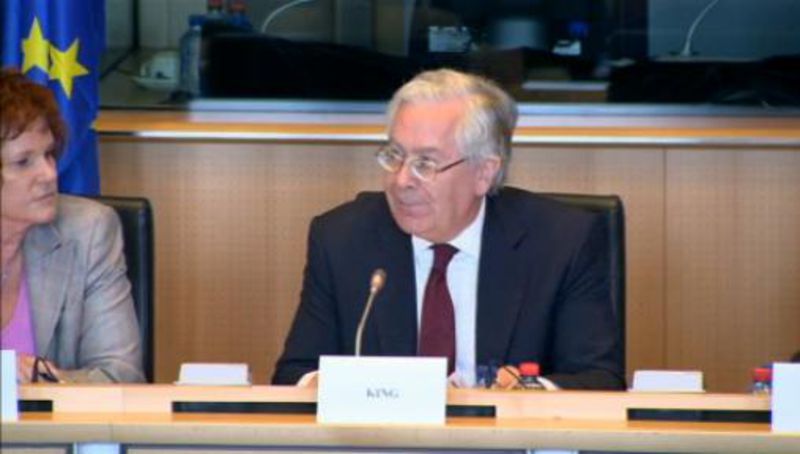The Tea Party of globalisation
euinside, February 15, 2010
 Do you remember that very amusing chapter in "Alice in Wonderland" when Alice got at the tea party at the Hatter where she met the strange White Rabbit with the watch and the large cat who spoke to each other absolutely rambling things but it was obvious that they were very serious and enjoyed it. Something similar is happening during discussions of financial regulation on a global and national level. By the way, a new group has emerged in the US, calling itself Tea Party whose purpose is to fight for more regulation and for keeping the free market in the same time.
Do you remember that very amusing chapter in "Alice in Wonderland" when Alice got at the tea party at the Hatter where she met the strange White Rabbit with the watch and the large cat who spoke to each other absolutely rambling things but it was obvious that they were very serious and enjoyed it. Something similar is happening during discussions of financial regulation on a global and national level. By the way, a new group has emerged in the US, calling itself Tea Party whose purpose is to fight for more regulation and for keeping the free market in the same time.
In an opinion in the Washington Post the columnist David Ignatius recommends something even more daring - Europe to have its own Tea Party with the only purpose to lobby for more fiscal conservatism.
The comment of the author is interesting because of what's happening in the eurozone, the Lisbon Treaty and Thursday's informal European Council under the presidency of the new European president Herman van Rompuy, it gives a very clear perspective of how does Europe look from the outside.
According to many "mainstream" analysts the participants in the American "Tea Party" are a right-wing fringe group, and in many respects, that label is deserved. As David Ignatius writes, "I wouldn't want them running the Treasury Department or the Federal Reserve". But these conservative populists do perform the useful function of focusing American political attention on the need for fiscal responsibility. They make a good point, for example, in arguing that we shouldn't add a major new entitlement program for health care until we've figured out how to pay for the entitlement programs we've already got.
Europe, by contrast, lacks this sort of potent conservative movement to constrain government spending. Given Europe's experience last century with virulent right-wing populism, its wariness of extremism is understandable. But it means that Europe lacks a strong voice for reducing public-sector spending and debt.
 Europe is in many respects an economic never-never land. It has a central bank to run a coordinated monetary policy, and a single currency, but it has several dozen finance ministries pursuing separate fiscal policies, many of which can be summed up as: spend, spend, spend. In fiscal terms, "Europe" is often a riderless horse, the columnist of Washington Post writes.
Europe is in many respects an economic never-never land. It has a central bank to run a coordinated monetary policy, and a single currency, but it has several dozen finance ministries pursuing separate fiscal policies, many of which can be summed up as: spend, spend, spend. In fiscal terms, "Europe" is often a riderless horse, the columnist of Washington Post writes.
Even more interesting, according to him is that investors accept such shaky situations right up to the moment that, for whatever mysterious reason, they panic and decide the situation is unsustainable. And that's what has been happening over the past several weeks as the financial markets have been voicing a collective "eeek!" about the European debt and fiscal mess (the case with Greece).
Greatest concern, of course, caused the so called pigs-nations - Portugal, Ireland, Greece and  Spain (PIGS). But debt is only part of the problem. The larger problem is the lack of political will in the slower-growing European countries to challenge public spending and put fiscal policy on a sustainable path.
Spain (PIGS). But debt is only part of the problem. The larger problem is the lack of political will in the slower-growing European countries to challenge public spending and put fiscal policy on a sustainable path.
Not a smaller problem is that there is not political pressure in Europe for spending restrictions. In conclusion, David Ignatius ends his article like this: "I wouldn't really wish the Tea Party movement on anyone, but the Europeans could use some of its passion about fiscal responsibility. And while we're thinking contrarian thoughts, how about a "conspicuous consumer" movement in high-saving Asia to push for greater domestic spending there?" This call is directed to seizing the monstrous US budget deficit as well as its indebtedness - mainly towards China.
But again a key question is not asked - why is Chinese production so cheap and makes the country the biggest exporter in the world? Because it is a frequent practice in Chinese factories where many European and American companies produce their goods, the workers are being paid a bowl of rice a day. They don't get any money. Another problem is that a large part of Chinese workers actually live in the factories they work in. How can we expect them to spend then?
 | © European Union
| © European Union | © European Union
| © European Union | © European Union
| © European Union